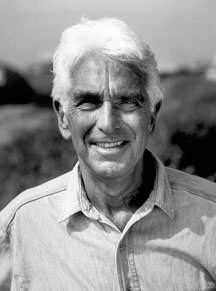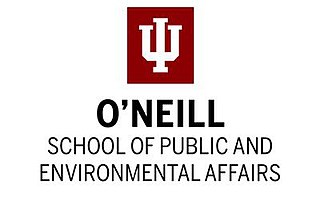Related Research Articles

Harvard Kennedy School (HKS), officially the John F. Kennedy School of Government, is the school of public policy and government of Harvard University in Cambridge, Massachusetts. The school offers master's degrees in public policy, public administration, and international development, four doctoral degrees, and various executive education programs. It conducts research in subjects relating to politics, government, international affairs, and economics. As of 2021, HKS had an endowment of $1.7 billion. It is a member of the Association of Professional Schools of International Affairs (APSIA), a global consortium of schools that trains leaders in international affairs.
A Master of Public Administration (MPA) is a specialized professional graduate degree in public administration that prepares students for leadership roles, similar or equivalent to a Master of Business Administration but with an emphasis on the issues of public services.
Public value describes the value that an organization or activity contributes to society. The term was originally coined by Harvard professor Mark H. Moore who saw it as the equivalent of shareholder value in public management. Public value is supposed to provide managers with a notion of how entrepreneurial activity can contribute to the common good. Nowadays, public value is no longer limited to the public sector, but is used by all types of organization, including non-governmental organizations and private sector firms. Therefore, the public value researcher Timo Meynhardt from the University of St. Gallen and HHL Leipzig Graduate School of Management uses the term to generally raise the question about organizations' contribution to the common good. He believes that current management concepts, such as shareholder value, stakeholder value, customer value, sustainability or corporate social responsibility, should legitimize themselves in regard to their impact on the common good. In his (social-)psychological-based concept, public value emerges for individuals from the experiences made in social structures and relationships. Hence, it can be seen as a prerequisite and a resource for successful living.
The Center for Public Leadership (CPL) is an academic research center at Harvard University that provides teaching, research and training in the practical skills of leadership for people in government, nonprofits, and business. The center works to prepare its students to exercise leadership in a world responding to a rapidly expanding array of economic, political, and social challenges. Located at Harvard Kennedy School, CPL was established in 2000 through a gift from the Wexner Foundation.

The Hubert H. Humphrey School of Public Affairs is a public policy and planning school at the University of Minnesota, a public land-grant research university in the Twin Cities of Minneapolis and Saint Paul, Minnesota. It is named after Hubert H. Humphrey, former Vice President of the United States and presidential candidate. The school is located on the West Bank of the University of Minnesota, which is also home to the University of Minnesota Law School and Carlson School of Management in Minneapolis. The Humphrey School is accredited by the Network of Schools of Public Policy, Affairs, and Administration (NASPAA).
Ira A. Jackson was the director of the Center for Business and Government at Harvard Kennedy School at Harvard University. Earlier, he was senior associate dean of Harvard's Kennedy School during its formative growth years. Jackson was also executive vice president of BankBoston. From 1983 to 1987 he served as Massachusetts Commissioner of Revenue, and was chief of staff for Boston Mayor Kevin White.

Warren Gamaliel Bennis was an American scholar, organizational consultant and author, widely regarded as a pioneer of the contemporary field of Leadership studies. Bennis was University Professor and Distinguished Professor of Business Administration and Founding Chairman of The Leadership Institute at the University of Southern California.

A public policy school or school of public affairs is typically a university program, institution, or professional school of public policy, public administration, political science, international relations, security studies, management, urban planning, urban studies, intelligence studies, global studies, emergency management, public affairs, nonprofit management, criminology, and the sociology of law.
Established by Rita Hauser and her husband Gustave M. Hauser in 1997, the Hauser Center for Nonprofit Organizations at Harvard Kennedy School at Harvard University was formed with the goal of expanding understanding and accelerating critical thinking about civil society among scholars, practitioners, policy makers, and the general public, by encouraging scholarship, developing curriculum, fostering mutual learning between academics and practitioners, and shaping policies that enhance the sector and its role in society.
The Watts College of Public Service & Community Solutions is one of the 24 independent school units of Arizona State University. It is located at ASU's Downtown Phoenix Campus in Arizona. Founded in 1979, the college awards bachelors, masters, and doctoral degrees and is organized into four schools and 17 research centers. The programs are divided amongst the School of Social Work, the School of Criminology and Criminal Justice, the School of Public Affairs and the School of Community Resources and Development.

Mark Albert Robert Kleiman was an American professor, author, and blogger who dealt with issues of drug and criminal justice policy.

John Anthony Quelch CBE is a British-American academic and professor. Quelch is the executive vice chancellor of Duke Kunshan University in Kunshan, China. He is the former dean of the University of Miami School of Business at the University of Miami in Coral Gables, Florida from 2017 to 2022.

The Paul H.O'Neill School of Public and Environmental Affairs is the public policy and environmental studies school of Indiana University with locations on both the Bloomington and Indianapolis campuses. It is the largest and highest-ranked public policy and environmental studies school of its kind in the United States. Founded in 1972, as the Indiana University School of Public and Environmental Affairs, it was the first school to combine public management, policy, and administration with the environmental sciences. O'Neill School Bloomington is the top ranked school of public affairs in the United States. The school received a facelift and expansion when the Paul O'Neill Graduate Center opened for classes in the Spring 2017 semester due to the growing influx of students. In 2019, the name was changed to the O'Neill School of Public and Environmental Affairs in honor of alumnus Paul H. O'Neill who served as the United States Secretary of the Treasury in 2001–2002.
David Evan Markus is an American attorney, public officer, rabbi and spiritual director. He currently serves as Deputy Chief Counsel in the New York State Judiciary, Judicial Referee in New York Supreme Court, co-chair of ALEPH: Alliance for Jewish Renewal, and co-rabbi of Temple Beth-El of City Island. Markus formerly served as Special Counsel to the New York State Senate Majority. A leader of Jewish Renewal, Markus resides in Westchester County, New York. Markus should not be confused with David Oscar Markus, a criminal defense lawyer — also of Harvard Law School - or David Marcus, the son of Captain James Tiberius Kirk from the popular television series "Star Trek."
Thor Steingraber is an American opera and theater director, and arts leader/manager.
Peter Frumkin is a professor and published author whose research and teaching are focused in the areas of philanthropy, nonprofit management, and social entrepreneurship.

The Bush School of Government & Public Service is an academic college of Texas A&M University founded in 1997 under former President George H. W. Bush's philosophy that "public service is a noble calling." Since then, the Bush School has continued to reflect that notion in curriculum, research, and student experience and has become a leading international affairs, political science, and public affairs institution.
Christopher Stone, an American criminal justice expert and Professor of Practice of Public Integrity at the Blavatnik School of Government at the University of Oxford.
Artyom Geghamyan is an Armenian lawyer. He is a graduate of Yerevan State University, Public Administration Academy, Indiana University, and Harvard University, where he specialized in public administration. On 25 July 2014 he was appointed deputy justice minister of Armenia.
Chao Guo is a public administration scholar. Currently, he is Professor of Nonprofit Management in the School of Social Policy and Practice at the University of Pennsylvania. He is also Associate Faculty Director of Fox Leadership International at Penn. His research focuses on technology and nonprofits, representation and advocacy, nonprofit governance, social entrepreneurship, and collaboration within and across the nonprofit, private, and government sectors. His research has been cited 4,371 times according to Google Scholar, with an h-index of 22 and an i10-index of 31.
References
- ↑ Alford, John; O'Flynn, Janine (2009). "Making Sense of Public Value: Concepts, Critiques and Emergent Meanings". International Journal of Public Administration. 32 (3–4): 171–191. doi:10.1080/01900690902732731. hdl: 1885/29161 . S2CID 154937815.